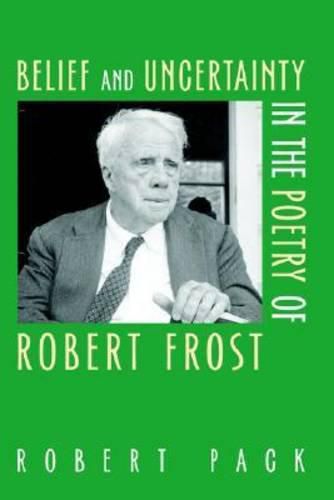Readings Newsletter
Become a Readings Member to make your shopping experience even easier.
Sign in or sign up for free!
You’re not far away from qualifying for FREE standard shipping within Australia
You’ve qualified for FREE standard shipping within Australia
The cart is loading…






Robert Pack’s lifelong delight in Robert Frost’s intricate, beautiful, and profound poetry shines through in the essays in this book. He confronts such broad themes as mourning, inheritance, nature, and the imagination, bringing to bear historical, psychological, Darwinian, and close-textual-reading interpretive approaches. Chapter one sets Frost’s work in the tradition of nature writing, from the Book of Genesis through modern American ecological works. Chapter two examines the profound influences of the Book of Job, Darwin, and evolutionary theory on Frost’s thinking. There follow chapters that structurally and philosophically compare Wordsworth’s Michael to Frost’s Wild Grapes, focusing on the themes of inheritance, grieving, and the potency of the imagination. The reader encounters Frost as teacher and preacher, Frost’s idea of how beliefs are affirmed, the simultaneous representation of adult memory and immediate childhood sensation, and the underlying duality of place and nothingness, which forms the existential background for his stay against confusion -the consoling purpose of Frost’s poetic art.
$9.00 standard shipping within Australia
FREE standard shipping within Australia for orders over $100.00
Express & International shipping calculated at checkout
Robert Pack’s lifelong delight in Robert Frost’s intricate, beautiful, and profound poetry shines through in the essays in this book. He confronts such broad themes as mourning, inheritance, nature, and the imagination, bringing to bear historical, psychological, Darwinian, and close-textual-reading interpretive approaches. Chapter one sets Frost’s work in the tradition of nature writing, from the Book of Genesis through modern American ecological works. Chapter two examines the profound influences of the Book of Job, Darwin, and evolutionary theory on Frost’s thinking. There follow chapters that structurally and philosophically compare Wordsworth’s Michael to Frost’s Wild Grapes, focusing on the themes of inheritance, grieving, and the potency of the imagination. The reader encounters Frost as teacher and preacher, Frost’s idea of how beliefs are affirmed, the simultaneous representation of adult memory and immediate childhood sensation, and the underlying duality of place and nothingness, which forms the existential background for his stay against confusion -the consoling purpose of Frost’s poetic art.